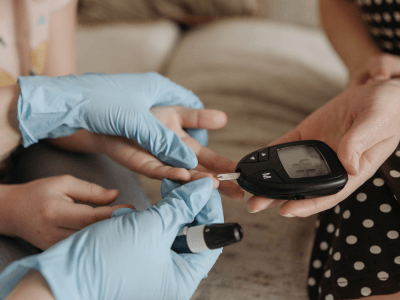Gestational diabetes (Pinellas Park, Tampa, St. Petersburg, Florida) is a condition that affects pregnant women, leading to high blood sugar levels. It typically develops during the second or third trimester and, if left unmanaged, can pose health risks to both the mother and baby. Understanding its symptoms, causes, and treatment options is essential for ensuring a healthy pregnancy. In this blog, the experts at Tampa Bay Endocrine provide a comprehensive guide on gestational diabetes.
What is Gestational Diabetes?
Gestational diabetes mellitus (GDM) is a form of diabetes diagnosed during pregnancy that was not present before conception. It occurs when the body cannot produce enough insulin to regulate blood sugar levels effectively. Although gestational diabetes usually resolves after delivery, it increases the risk of developing type 2 diabetes later in life.
Symptoms of Gestational Diabetes
Gestational diabetes symptoms (in Pinellas Park, Tampa, St. Petersburg, Florida) can be subtle, but understanding them is crucial for early detection and management.
- Increased Thirst & Frequent Urination: High blood sugar levels lead to excess glucose in the urine, drawing more fluids from the body and causing dehydration.
- Fatigue & Tiredness: The body’s inability to efficiently use glucose for energy results in persistent tiredness.
- Blurred Vision: Elevated blood sugar affects fluid levels in the eyes, leading to temporary vision disturbances.
- Nausea & Vomiting: Blood sugar fluctuations can trigger nausea, which may be mistaken for morning sickness.
- Unexplained Weight Loss: Despite increased appetite, the body may not absorb glucose properly, leading to weight loss.
- Recurrent Infections: High blood sugar weakens immune function, increasing susceptibility to urinary tract infections, yeast infections, and slow wound healing.
Since these symptoms can be mistaken for normal pregnancy changes, routine screening is vital for early detection and proper management.
Causes and Risk Factors
Gestational diabetes develops due to hormonal changes during pregnancy that affect insulin function. Some risk factors that increase the likelihood of developing GDM include:
- Being overweight or obese before pregnancy
- Family history of diabetes
- Previous diagnosis of gestational diabetes
- Polycystic ovary syndrome (PCOS)
- Being over the age of 25
- History of giving birth to a baby over 9 pounds
- Belonging to certain ethnic groups (such as African American, Hispanic, Native American, or Asian)
Diagnosis of Gestational Diabetes Florida
Gestational diabetes is diagnosed through specialized blood tests that assess the body’s ability to process glucose. The Glucose Challenge Test (GCT) is a preliminary screening where the patient drinks a sugary solution, and blood sugar levels are measured an hour later. If results are elevated, an Oral Glucose Tolerance Test (OGTT) is conducted, which requires fasting beforehand and multiple blood sugar checks over a few hours after consuming glucose. A confirmed diagnosis is made when blood sugar levels exceed the normal range, prompting the need for close monitoring and management.
Treatment and Management
Managing gestational diabetes is crucial to prevent complications for both the mother and baby. Treatment options include:
1. Healthy Diet and Nutrition
A well-balanced diet plays a key role in controlling blood sugar levels. Recommended dietary guidelines include:
- Eating high-fiber, low-glycemic index foods (whole grains, vegetables, and legumes)
- Choosing lean proteins and healthy fats
- Limiting refined carbohydrates and sugary foods
- Eating smaller, frequent meals to stabilize blood sugar levels
2. Regular Physical Activity
Exercise helps improve insulin sensitivity and maintain blood sugar control. Pregnant women with gestational diabetes should aim for at least 30 minutes of moderate activity, such as:
- Walking
- Swimming
- Prenatal yoga
- Low-impact aerobics
3. Blood Sugar Monitoring
Self-monitoring of blood glucose levels is vital for effective management. Women with gestational diabetes are advised to check their blood sugar at specific times:
- Fasting (before breakfast)
- One or two hours after meals
4. Medication and Insulin Therapy
If diet and exercise are not sufficient to control blood sugar, healthcare providers may prescribe:
- Insulin injections: The most common treatment when lifestyle changes are insufficient.
- Oral medications: Some doctors may recommend metformin or glyburide, though insulin remains the preferred option during pregnancy.
Potential Complications of Gestational Diabetes
If left untreated, gestational diabetes can lead to complications, including:
For the Baby:
- Excessive birth weight (macrosomia)
- Increased risk of childhood obesity and type 2 diabetes
- Low blood sugar (hypoglycemia) after birth
- Preterm birth or respiratory distress syndrome
For the Mother:
- Increased risk of preeclampsia
- Higher likelihood of C-section delivery
- Greater risk of developing type 2 diabetes later in life
Preventing Gestational Diabetes in Florida
While some risk factors cannot be changed, adopting a healthy lifestyle before and during pregnancy can help reduce the risk of developing gestational diabetes. Recommendations include:
- Maintaining a healthy weight before pregnancy
- Following a balanced diet rich in whole foods
- Staying physically active
- Managing stress levels
Conclusion
Gestational diabetes (Pinellas Park, Tampa, St. Petersburg, Florida) is a manageable condition with proper care and lifestyle modifications. Early detection, a healthy diet, regular exercise, and monitoring blood sugar levels can help ensure a safe pregnancy and reduce complications. If you are at risk or have concerns, consult with the specialists at Tampa Bay Endocrine for expert guidance and personalized care.

